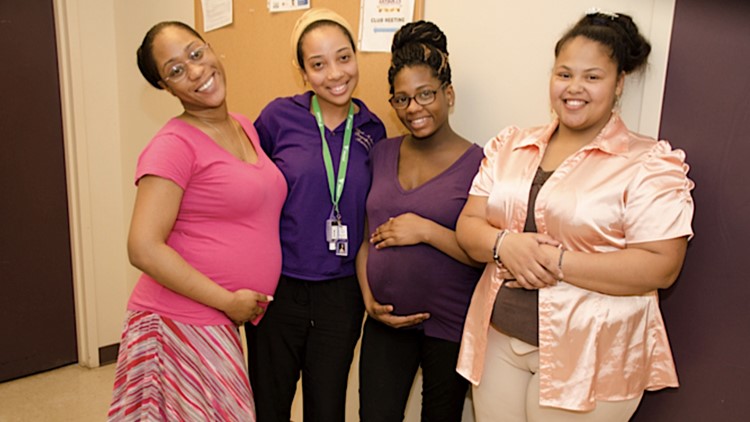More than 20% of St. Louis County infants had not initiated breastfeeding between 2017 and 2021. Breastfeeding was lowest among infants born to Black mothers, with a rate of 66% at hospital discharge - 17% lower than the county average - according to the report.
Mothers often face multiple barriers to breastfeeding that contribute to disparities across social and economic groups.
Racial bias in the health care setting is of particular concern as hospitals are twice as likely to provide formula to Black women than to white women nationally.
The Department of Public Health said obstacles making breastfeeding more difficult include lack of paid parental leave, inflexibility in the workplace, cultural norms that favor bottle feeding, and bias from health care providers.
These barriers disproportionately impact Black, Native American, and Alaskan Native mothers - who often have a low socioeconomic status - and mothers with lower education attainment.
Racial bias in the health care setting is of particular concern as hospitals are twice as likely to provide formula to Black women than to white women nationally. In addition, women and birthing people may experience physical barriers such as sore nipples, leaking milk, pain, and difficulty latching on by the infant.
Strategies to increase breastfeeding initiation include education-focused interventions, such as educational programs led by doctors and nurses, and also peer support groups led by trained volunteers, and hospital-based interventions.
This can include increasing maternal-infant skin-to-skin contact after delivery, initiating breastfeeding within the first hour of birth and reducing maternal-infant separation.
DPH offers breastfeeding support for new mothers in St. Louis County through organizations like Building Blocks of Missouri-St. Louis Region Nurse-Family Partnership.
The group connects specially trained nurses with first-time moms-to-be early in pregnancy and continuing through the child’s second birthday. Expectant mothers receive care and support throughout their pregnancy and early parenthood journeys.
SSM Health DePaul Hospital – St. Louis announced that it achieved the highly prestigious international “Baby-Friendly” designation in August. The honor demonstrates that SSM Health DePaul Hospital is adhering to the highest standards of care for breastfeeding mothers and their babies.
“We are extremely proud to be recognized for the hard work of our team members throughout the Baby-Friendly process,” says Sriram Vissa, MD, SSM Health DePaul Hospital interim president, chief medical officer, and vice president of medical affairs.
“SSM Health DePaul Hospital is committed to providing the support, education and resources moms need to successfully initiate breastfeeding and continue breastfeeding when they leave our care.”
Health authorities recognize the positive health effects of breastfeeding, and according to the Center for Disease Control and Prevention include:
-Breast milk being the best source of nutrition for most babies.
-As the baby grows, the mother’s breast milk will change to meet the baby’s nutritional needs.
-Breastfeeding can help protect babies against some short- and long-term illnesses and diseases.
-Breastfed babies have a lower risk of asthma, obesity, type 1 diabetes, and sudden infant death syndrome (SIDS). Breastfed babies are also less likely to have ear infections and stomach bugs.
-Breast milk shares antibodies from the mother with her baby.
These antibodies help babies develop a strong immune system and protect them from illnesses.
-Breastfeeding can reduce the mother’s risk of breast and ovarian cancer, type 2 diabetes, and high blood pressure.
“This designation is the culmination of a lot of hard work and determination across our organization, all with a goal of helping families get off to a good start,” says Dr. Vissa.
“We are proud to offer an environment that supports best practices shown to increase breastfeeding exclusivity and duration and are committed to giving moms who choose to breastfeed the best chance for success. This continues our commitment to providing exceptional women’s health services including the only provider of obstetrics services in North County.”
The Surgeon General’s 2011 Call to Action to Support Breastfeeding stated that “Breast milk is uniquely suited to the human infant’s nutritional needs and is a live substance with unparalleled immunological and anti-inflammatory properties that protect against a host of illnesses and diseases for both mothers and children.”
Shannon Schrum, lactation consultant at SSM Health DePaul Hospital, said she supports the Ten Steps to Successful Breastfeeding recommended by the World Health Organization (WHO) and the United Nations Children's Fund (UNICEF) for optimal infant feeding support in the precious first days of a newborn’s life.
“The first one is just maintaining and achieving a policy that supports breastfeeding and all the research behind that; evidence-based practice is so important these days as well as educating the nursing staff and physicians on that policy,” she said.
She calls the first few days of a baby’s life “a critical time for both parent and baby since their bodies are really listening to each other.”
SSM Health DePaul Hospital is among more than 20,000 hospitals and birth centers “that provide an environment that supports breastfeeding while respecting every woman’s right to make the best decision for herself and her family,” according to its Baby-Friendly designation.


